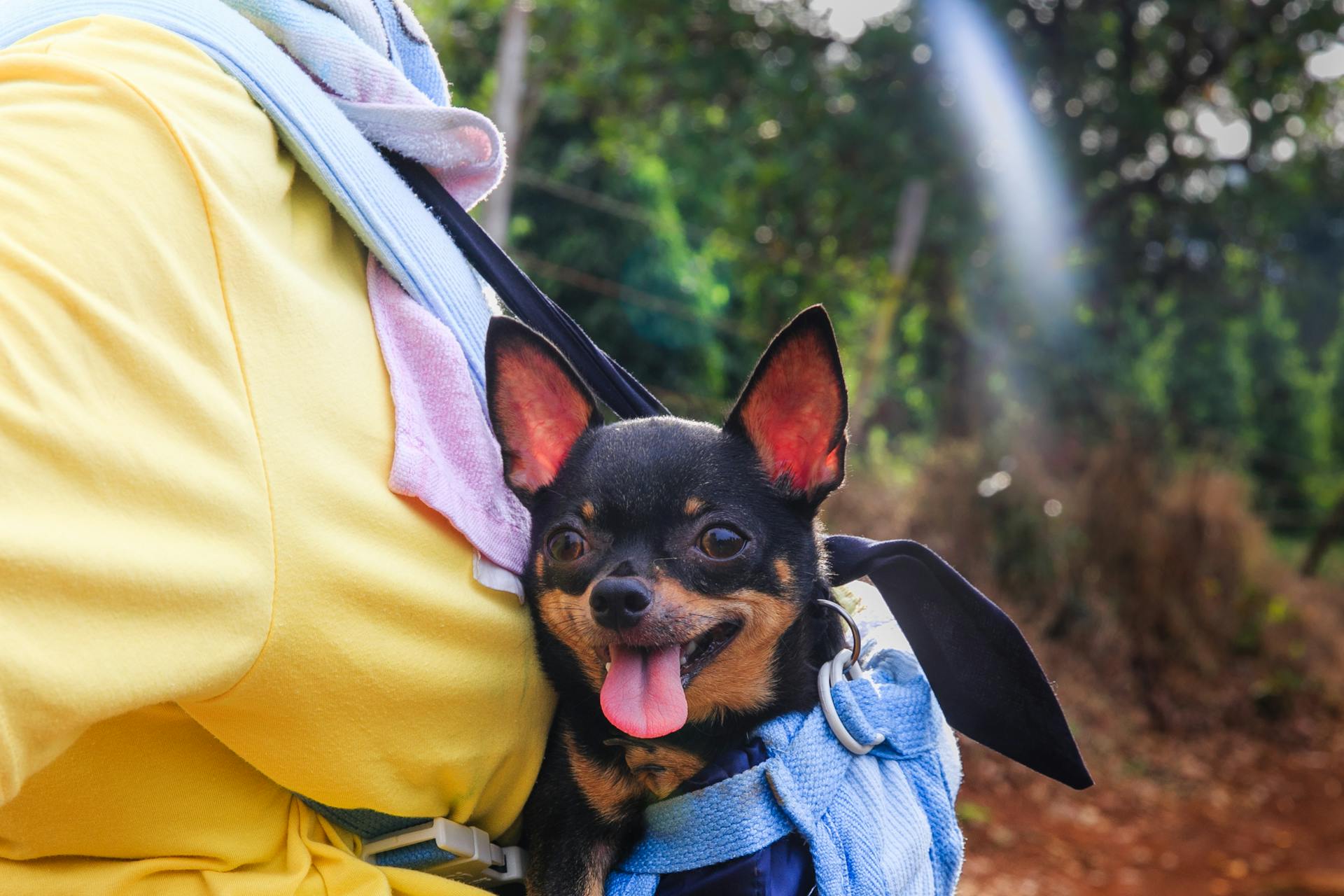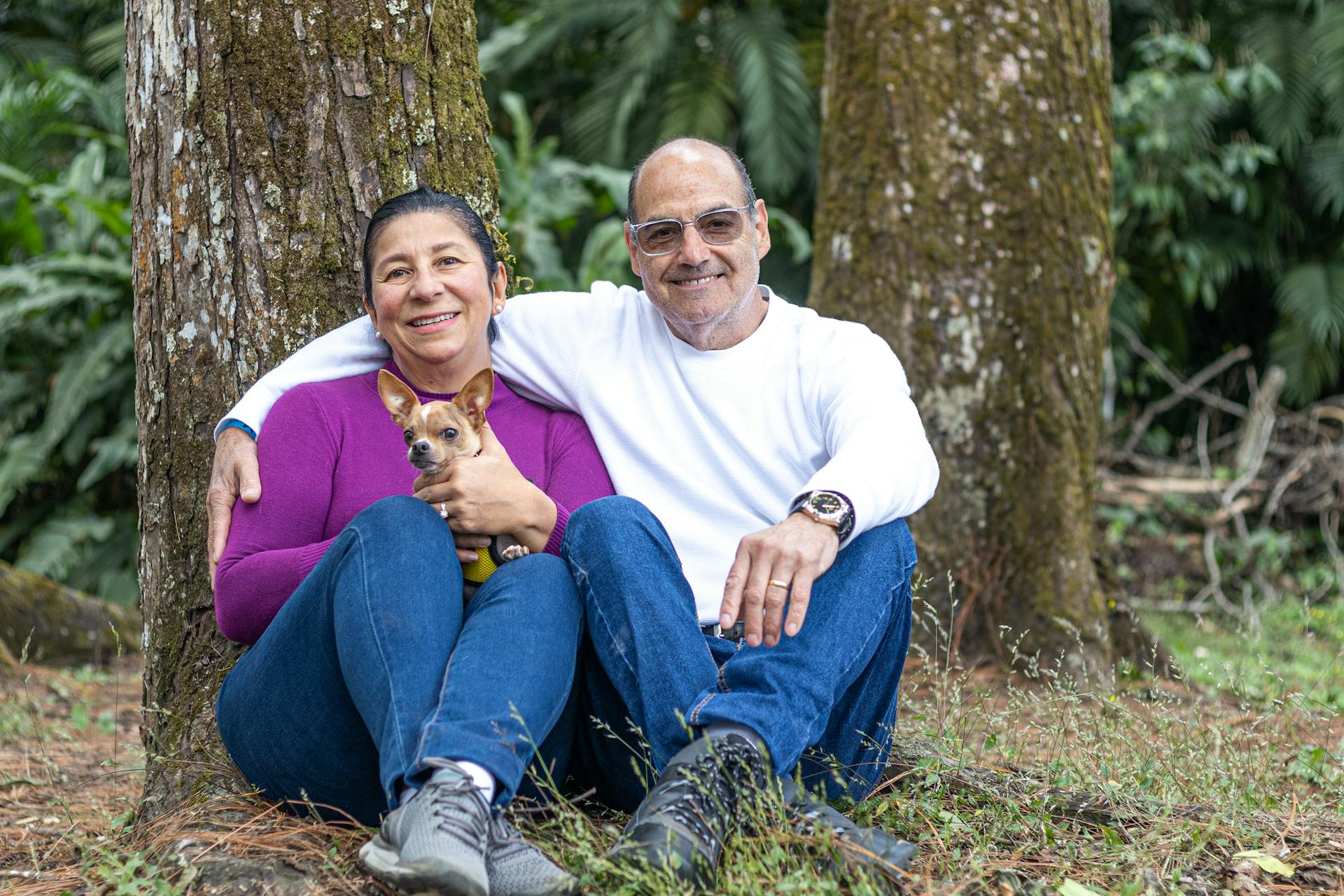
Chihuahuas have a strong instinct to defend their territory and family, which can sometimes be misinterpreted as aggression. They are naturally wary of strangers due to their small size and historical need to be cautious of predators.
In fact, Chihuahuas have been known to be fierce watchdogs, alerting their owners to potential threats with a loud bark. Their small size belies their big personality and protective nature.
Chihuahuas are often described as " Velcro dogs" because of their tendency to stick close to their owners, which is a natural instinct to feel safe and protected. This loyalty is a testament to their protective nature.
Despite their small size, Chihuahuas can be quite assertive when defending their loved ones, and their loud bark can be an effective deterrent to potential intruders.
Additional reading: Do Chihuahuas Bark a Lot
Understanding Chihuahua Behavior
Chihuahuas are smart and eager to please, making them generally receptive to positive reinforcement training methods.
Proper training can help channel a Chihuahua's energy and assertiveness in a positive direction, teaching them desirable behaviors and reducing potential hostility.
Expand your knowledge: Training a Dog to Protect
Early socialization is especially vital for Chihuahuas, helping to reduce unwarranted fear or defensiveness, often mistaken for aggression.
Introducing them to various environments, people, and other animals can help Chihuahuas become more confident and calm in new situations.
Chihuahuas are deeply influenced by the quality and consistency of their training, which can significantly impact their behavior and temperament.
Aggression in Chihuahuas
Aggression in Chihuahuas is a common issue that can be caused by a lack of socialization and training. Chihuahuas are naturally protective and alert, which can lead to barking and aggression towards strangers or other animals.
Teasing is also a major contributor to aggression in Chihuahuas. When owners tease their dogs, it can create fear and anxiety, leading to aggressive behavior.
Proper socialization from an early age is key to preventing aggression in Chihuahuas. This includes introducing them to various situations, people, and animals, such as children, other dogs, men, women, crowds, babies, people with crutches, and people in wheelchairs.
A different take: Why Do People like Chihuahuas
Here are some specific situations to socialize your Chihuahua to:
- Children (with supervision)
- Other dogs (with supervision)
- Men
- Women
- Crowds
- Babies (with supervision)
- People with crutches
- People in wheelchairs
- Walking on different surfaces, such as carpet, tile, hardwood, and concrete
Consistent training and positive reinforcement techniques can also help manage aggression in Chihuahuas. By teaching basic commands like "sit", "down", "stay", "come", and "leave it", you can establish a sense of control and help your dog feel more secure.
In fact, knowing basic commands is essential for a Chihuahua's safety and well-being. It's also a great way to bond with your dog and establish a sense of trust.
If you're unsure about how to address aggression in your Chihuahua, consider hiring a professional trainer for guidance and support. With patience, persistence, and proper training, you can help your Chihuahua become a well-behaved and loving companion.
Curious to learn more? Check out: Majorca Shepherd Dog Temperament
Protective Instincts in Chihuahuas
Chihuahuas are incredibly loyal to their owners, often forming strong attachments. This can sometimes manifest as protectiveness, leading to barking or nipping when they perceive a threat.
Their protective nature can be a result of their fierce loyalty, but it's essential to remember that it's not the same as aggression. Chihuahuas are brave and will fight to the death to protect the ones they love.

Early socialization and training are crucial to ensure their protective instincts don't escalate into aggression. This means exposing them to new people, animals, and environments from an early age to help them feel more confident and calm in new situations.
Chihuahuas have a Napoleon complex, which means they can be bold and fearless despite their small size. This can sometimes lead to them standing up to larger animals or strangers, even if it's not the safest or most effective approach.
Their protective instincts are a result of their loyalty and devotion to their owners, making them loving and loyal companions.
General Chihuahua Topics
Chihuahuas are known to be alert and protective dogs, traits that can lead to barking when they sense unfamiliar presences. This behavior can be a form of communication or perceived defense.
Their small size doesn't go unnoticed by Chihuahuas, who are very aware of their size and react to fear aggressively. They try to bark, growl, and show their teeth, hoping to scare away what they perceive as a threat.
A lack of socialization and training is often the reason for unwanted behavior in Chihuahuas, which can be channeled into very unwanted behavior. This can include being perceived as mean, aggressive, or even "Mexican Pit Bulls."
Teaching your Chihuahua basic commands is essential for their own safety and for your peace of mind. Knowing the basic commands is a must for a well-mannered, civilized dog living in your house.
Some of the most important basic commands for Chihuahuas include:
- Sit
- Down
- Stay
- Come
- Leave it
- Enough
The "enough" command is particularly important for Chihuahuas, who can be prone to barking at every little thing. By teaching them when it's "enough", you can help them become excellent little watchdogs without driving yourself crazy with their constant barking.
Broaden your view: Chihuahuas Barking
Managing a Chihuahua's Aggressive Tendencies through Training
Training is essential in molding a Chihuahua's behavior, and positive reinforcement techniques can channel their energy positively. Early and consistent training sessions help mitigate potential aggression and encourage well-balanced behavior.
Chihuahuas are smart and eager to please, making them generally receptive to positive reinforcement training methods. Proper training can help channel a Chihuahua's energy and assertiveness in a positive direction, teaching them desirable behaviors and reducing potential hostility.
Early socialization is especially vital for Chihuahuas, as it can help reduce unwarranted fear or defensiveness, often mistaken for aggression. Introducing them to various environments, people, and other animals can help them interact amicably with dogs of all sizes.
Proper training and early socialization can help manage a Chihuahua's tendency to bark excessively at strangers or other animals. This behavior can be a form of communication or perceived defense.
Here are some essential basic commands that every Chihuahua should learn:
- Sit
- Down
- Stay
- Come
- Leave it
- Enough
Teaching a Chihuahua to understand when it's "enough" barking can be especially helpful, as they often bark at things that us humans don't notice. With patience and dedication, even mature Chihuahuas can learn new behaviors and become well-mannered companions.
Sources
Featured Images: pexels.com


